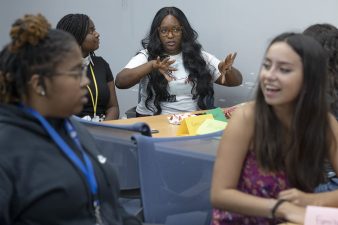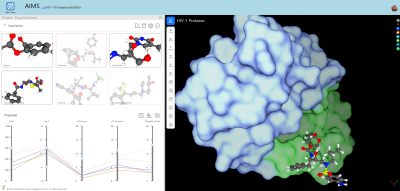UMB RAMP: UMB Research And Mentoring Program to develop skills and promote interest in STEM fields through hands-on exposure to academic research among West Baltimore Youth
-
Project Description
Project Narrative Workforce diversification is essential to meet growing US demands in aging research, biomedical science and broader STEM fields. Older Americans are one of the fastest growing demographics in the country, yet geriatric educational training programs are lacking, particularly among younger students. The UMB RAMP program will fill this gap by providing West Baltimore high school students with foundational knowledge required to understand and translate concepts related to aging research while providing the skills to perform basic lab techniques and clinical skills that will be applied in a lab or research-based experience with UMB faculty conducting aging-focused research as a strategy to expose young students to the aging field.
-
Abstract
There is a national effort to diversify the aging-focused STEM and healthcare workforce in order to eliminate health disparities and improve health equity. Older Americans are one of the fastest growing demographics in the country, yet geriatric education and training programs are lacking. To address this educational need, we developed an aging-focused curriculum that provides an introduction to basic, clinical and translational research that incorporates hands on training components for high school students. This curriculum aligns with Next Generation Science Standards to provide foundational knowledge required to understand and translate concepts related to aging research across the continuum while providing the skills to perform basic lab techniques and clinical skills. We propose to implement and evaluate this basic, clinical and translational research nanocourse that promotes skill development with the goal of preparing students for a subsequent aging-focused applied research experience in year 2, and adds a training component for professional mentors. Completion of this program’s first year would serve as a “RAMP” to the next step: a lab or research-based experience with Pepper Center and UMGCCC affiliated faculty conducting aging-focused research during the second summer. Specifically, we aim to: Aim 1: Implement the curriculum developed in our pilot study with new cohorts of West Baltimore HS students via a 2-year program consisting of a 5-week summer program and school year research rotation experiences in year one followed by an applied summer research experience during the second summer. Students will receive real-time exposure to basic science labs and clinical gerontology research settings while progressively acclimating to the academic research environment. This authentic experience in aging research will excite them about biomedical/health-focused STEM subjects and inspire them to pursue aging-focused academic research in college and their careers. Aim 2: Develop and implement a mentor training program for near peer and professional faculty mentors. This training program will prepare mentors to work with high school students, including how to communicate and understand their mentees as well as introduce some of the challenges these students may face from growing up in West Baltimore. Aim 3: Evaluate the impact of program components on scholars and mentors and the impact of the RAMP program across the pipeline of UMB educational training programs. Workforce diversification is essential to engage this underutilized resource and meet growing US demands in aging research, biomedical science and broader STEM fields. This program will allow students to build their CV with skills and experiences to make them more competitive for future research programs while building confidence and self-efficacy that they belong in an academic research environment and ultimately in a biomedical science career.





